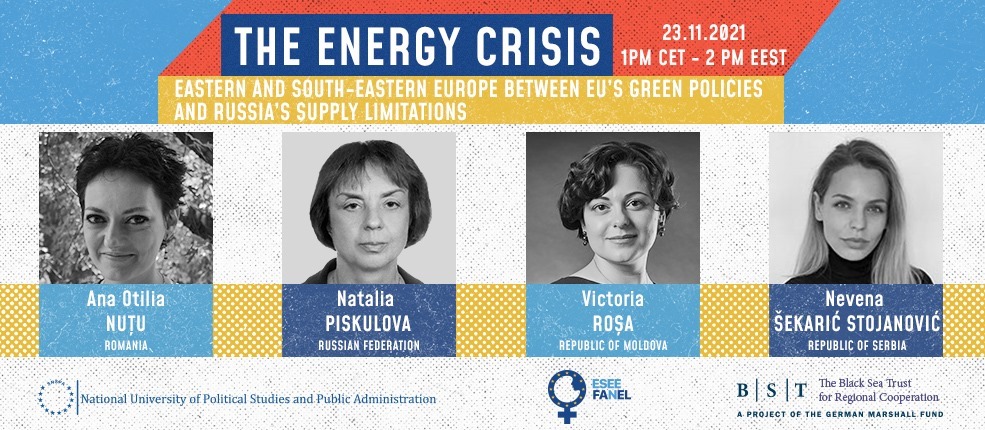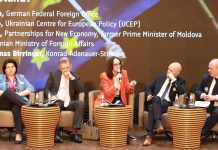“The Energy Crisis. Eastern and South-Eastern Europe between EU’s Green policies and Russia’s supply limitations” webinar aims at discussing the European Union’s options for maintaining its goals for a green energy transition, while facing the volatility of prices and supply on the regional and global energy market.
The global energy crunch, generated by a reduction in supply caused by the unfolding of the pandemic, coupled with Russia’s decision to restrict gas deliveries to Europe on the spot market, led to an increase in gas prices by up to 400% since the beginning of the year.
The impact of the global energy market dynamics on the EU has been extended by the pressure exercised by Russia, since Russia seems to be using energy resources to put pressure on the Republic of Moldova and Ukraine, countries which are Eastern Partnership members. The costs incurred on these countries are even higher than those on other EU Member States, despite their close relations with Brussels. Countries in the Western Balkans are not insulated from these shockwaves, given their small energy markets and their commitment to joining the EU, and adopting its regulations, including those concerning green energy.
This situation poses challenges not only to the energy market balance or to the skyrocketing gas prices within the European Union, but also to the envisioned European green transition and to the capacity of the European Union to act as a green normative power and as a safety net for the energy markets in the region.
Questions to be addressed during the webinar
• What are the main drivers of the energy crisis in Europe and how is the European Union tackling its energy dependence on Russia?
• How are the Eastern and South-Eastern European countries affected by the energy crunch and how are they coping with its effects on the population, which is already highly affected by the Covid-19 pandemic?
• Is the transition to green energy tenable in European Union, considering the disparities in the economies and energy systems of the Member States? How is the green transition agenda impacting the relations between the European Union and Russia?
• How are the Eastern and South-Eastern European countries affected by the energy crunch and how are they coping with its effects on the population, which is already highly affected by the Covid-19 pandemic?
• Is the transition to green energy tenable in European Union, considering the disparities in the economies and energy systems of the Member States? How is the green transition agenda impacting the relations between the European Union and Russia?
Keynote speakers:
• Ana Otilia NUȚU, Policy analyst on Energy and Infrastructure at Expert Forum, EU coordinator of the Eastern Partnership Civil Society Forum (EaP CSF), consultant for the World Bank on Public Administration reform, Romania;
• Natalia A. PISKULOVA, Professor, Chair of International Economic Relations and Foreign Economic Affairs, School of Government and International Affairs, Moscow State Institute of International Relations (MGIMO University), Russian Federation;
• Victoria ROȘA, International Relations expert, member of the Foreign Policy Association (APE), Security and Defence/ EU Affairs Adviser to the Moldovan Prime-minister, Republic of Moldova;
• Nevena ŠEKARIĆ STOJANOVIĆ, PhD candidate at the University of Belgrade, and Research Associate at the Institute of International Politics and Economics in Belgrade, Republic of Serbia.
• Natalia A. PISKULOVA, Professor, Chair of International Economic Relations and Foreign Economic Affairs, School of Government and International Affairs, Moscow State Institute of International Relations (MGIMO University), Russian Federation;
• Victoria ROȘA, International Relations expert, member of the Foreign Policy Association (APE), Security and Defence/ EU Affairs Adviser to the Moldovan Prime-minister, Republic of Moldova;
• Nevena ŠEKARIĆ STOJANOVIĆ, PhD candidate at the University of Belgrade, and Research Associate at the Institute of International Politics and Economics in Belgrade, Republic of Serbia.
Moderator: Ana-Maria ANGHELESCU, PhD candidate at the National University of Political Studies and Public Administration (SNSPA), Romania.
Host: Professor Liliana POPESCU, Vice-Rector for International Relations, SNSPA, Romania.
Registration to the event is available here.







